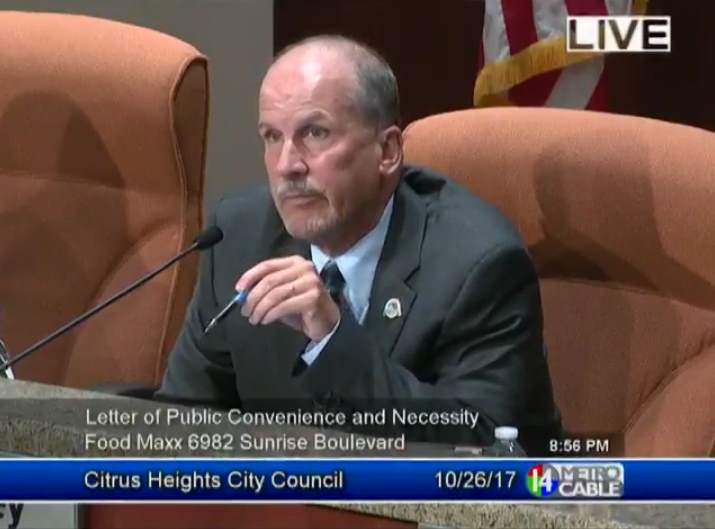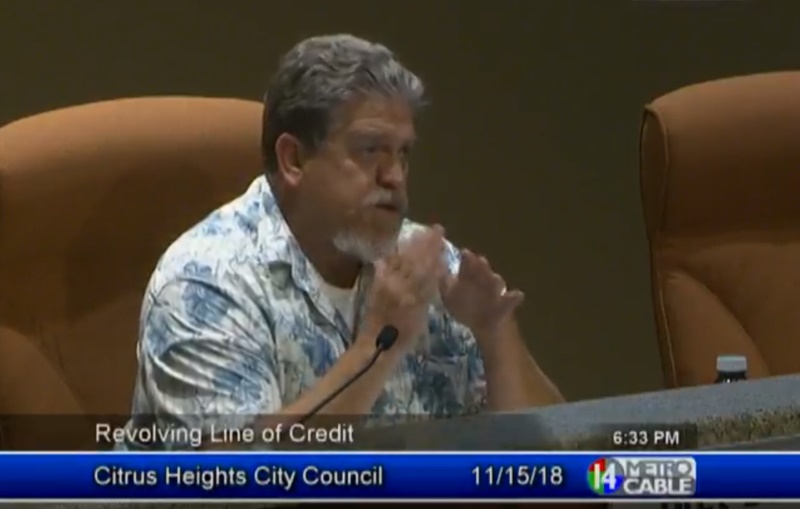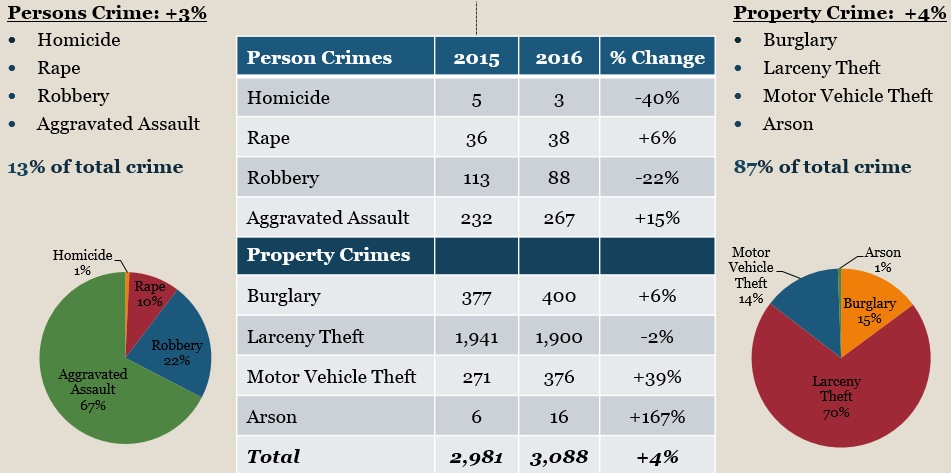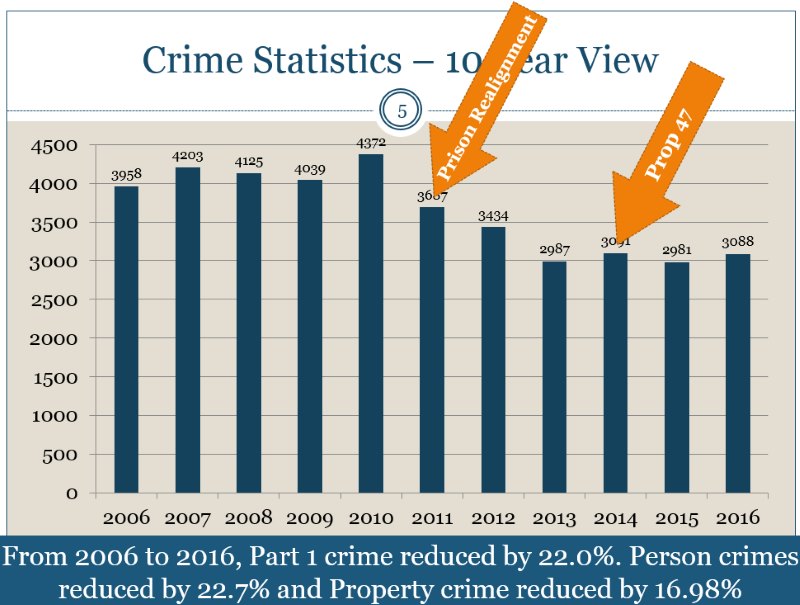Sentinel staff report–
Mayor Jeff Slowey gave the annual “State of the City” address during an Aug. 8 luncheon at the Citrus Heights Community Center, highlighting new proposed developments, increases in projected revenue, accomplishments from the past year, and some challenges faced by the city.
Slowey kicked off his 25-minute speech to the group of about a hundred business representatives and city staff, focusing on Citrus Heights’ landmark celebration of 20 years since becoming a city in 1997. Slowey, 56, also served a one-year term as mayor during the city’s 10th anniversary in 2007, and again in 2012.
Budget
The mayor gave an overview of the city’s $35 million general fund budget and said Citrus Heights remains “fiscally sound” with 2017-18 projections showing a 3 percent increase in general fund revenues and a 4 percent increase in expenditures.
 Pointing to a pie chart slide showing a breakdown of revenue categories, Slowey said 70 percent of the city’s income comes from three sources: sales tax, property tax and motor vehicle fees. The largest chunk — about 35 percent — comes from sales tax, followed by 22 percent from motor vehicle licensing and 14 percent from property taxes.
Pointing to a pie chart slide showing a breakdown of revenue categories, Slowey said 70 percent of the city’s income comes from three sources: sales tax, property tax and motor vehicle fees. The largest chunk — about 35 percent — comes from sales tax, followed by 22 percent from motor vehicle licensing and 14 percent from property taxes.
A slide covering expenses showed the majority of funds go to the Citrus Heights Police Department, with 57 percent of the budget going toward law enforcement. Remaining expenses cover general management, 20 percent, and between 5 and 6 percent each for general services, community and economic development, and human resources.
Police & Crime
Slowey said the transition of former Police Chief Christopher Boyd over to city manager of Citrus Heights went well, saying the city went from “one good egg, to another good egg” after Chief Ron Lawrence officially replaced Boyd last October.
He also focused on a slide showing officers responded to more than 88,000 calls for service and another 21,000 officer-initiated actions in town last year. “It’s not a surprising figure that law enforcement is the biggest expense to the city because to me that’s the main job of government,” Slowey said.
Related: Annual report: overall crime up 4% in Citrus Heights
Although citing call volume statistics from Chief Lawrence’s annual crime report in March, Slowey did not mention crime statistics reported by the chief that showed a 4 percent overall rise in crime in the city, including a double-digit increase in motor vehicle theft in 2016.
However, he expressed confidence that Lawrence would take the city to the “next level in law enforcement.”
Homelessness
On homelessness, Slowey praised the work of the city’s Navigator program in helping homeless get off the streets and into housing, but said “there’s not a lot that can be done” to help those who don’t want to be helped.
The city approved a $50,000 contract for the Navigator’s services last year and renewed the contract for the current fiscal year after leaders credited the program with aiding in a reduction of homeless-related calls for service to police in 2016.
Related: CHPD: new survey shows significant drop in homeless-related calls in Citrus Heights
“It’s a difficult problem, to be quite honest with you,” said the three-term mayor. “But I do think… we’re getting a pretty good bang for our buck.”
Businesses and development
Slowey highlighted the debt-free purchase of the new $22 million city hall last year, as well as the recent addition of new restaurants and businesses like Black Bear Diner on Sunrise Boulevard, Yellow Yo Yogurt at Sylvan Corners, and Crepes & Burgers on Auburn Boulevard.
He also cited the new 68,000-square-feet medical office building under construction on Greenback Lane, as well as a developer’s proposal to build 261 homes on vacant land near Arcadia Drive. A 42-unit multi-family development has also been proposed at Sylvan Corners on vacant land behind Bearpaw’s corporate offices, and a developer recently announced plans to demolish the old Logan’s restaurant on Sunrise Boulevard and construct a 10,000-square-feet building for several new restaurants and retailers.
Slowey also called the now-vacant Sylvan Middle School property on Auburn Boulevard the city’s “biggest opportunity” and said the city has expressed its intention to purchase the property. He said the goal would be “to control it” rather than own it long term, which would mean buying it and then selling it for a use the city deems most appropriate for the strategic corner.
Speculating about future use, Slowey shot down the idea of a dog park or sports complex, advocating that the city focus on uses that would bring direct sales tax revenue. He said parks or a sports complex would create additional maintenance costs and estimated a construction price of $9 million for a sports complex.
From April: City makes formal step toward buying old Sylvan property
The mayor also gave an overview of the three main business groups that make up the city’s primary sales tax base: the Sunrise Marketplace business improvement district, Antelope Crossing near Interstate 80, and the newly formed Auburn Boulevard Business Association.
Slowey spoke highly of the business improvement district model, where businesses vote to pay a tax to fund projects in their area.
“When businesses vote to tax themselves and spend that money on promoting themselves… as the public partner, I am willing to go in and spend money with them,” the mayor said. He said Sunrise Marketplace has been an improvement district since 1999 and the newly formed Auburn Boulevard Business Association is planning to develop a plan of action later this year, which could include consideration of an improvement district model.
A city branding campaign is also currently in the works, with plans to soon present a logo and tagline for the city to help attract new businesses and residents.
Challenges
Slowey also noted three challenges the city faces — sales tax revenue is projected to be flat, there is a reduced general fund reserve balance, and there’s another five years still remaining on the city’s “revenue neutrality” agreement with the county.
Under the agreement with the county, Slowey said the city has lost out on $76 million in revenue from property tax money that currently goes to Sacramento County, as part of a 25-year agreement that was a condition of Citrus Heights being allowed to incorporate as a city. The agreement expires in 2022.
Transportation and roads
Slowey skimmed over slides on capital projects that included photos and statistics showing the city had recently replaced 20,000 feet of failed sidewalk, constructed 50 ADA ramps, and resurfaced five residential streets, over the past year. Work was also done on the Antelope Road Safe Routes to School Project between Auburn Boulevard and Rollingwood Drive, along with enhanced street lighting and various creek restoration projects.
He said funding for roads is also expected to come in the near future, after the state legislature approved a recent controversial gas tax.
The mayor also said the city is working on a comprehensive plan for transit services in Citrus Heights, noting his personal dissatisfaction with Regional Transit’s use of funds and also commenting about limitations of transit when buses reach the county line.
“There’s a lot of other agencies and cities out there that are looking at Uber and Lyft subsidizing rides for people — it’s cheaper,” said Slowey, who also works as a banking executive. “For the amount of dollars we spend [on transit], we ought to be giving a lot better service to you folks.”
Slowey concluded his Aug. 8 presentation with a tribute to the late-Councilman Mel Turner, who passed away in April.
Related: Citrus Heights leaders set 22 new objectives for next 6 months
Save
Save
Save
Save
Save
Save
Save
Save
Save
Save
Save
Save












